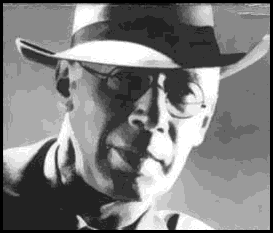Of Maroussi
Henry Miller
(New Directions)

Henry Miller probably shot himself in the foot with his earliest (and possibly greatest) books, Tropic of Cancer and Tropic of Capricorn. They were so deliriously inflamed with indelicate passages that they were banned in America and England for over thirty years, appearing only in France through the "Traveller's Companion" series out of Paris, sold under-the-counter and to me just before I came back to America, where my malfeasance was discovered by a vigilant customs agent, who roundly scolded me for my "taste in literature."
'Tis a pity because Miller was and remains an extraordinary writer. When gets in on one of his riffs, you feel like a puppy that has been picked up by the scruff, tossed this way and that until the gods finally decide to put you down. This is his tale of a Christmas dinner in Athens: "The food was abominable. But the lights were splendiferous! In fact, the illumination was so brilliant that the food began to look hallucinatingly enticing."
- To me at least it was really beginning to look like Christmas --- that is to say, sour, moth-eaten, bilious, crapulous, worm-eaten, mildewed, imbecilic, pusillanimous and completely gaga.
It's not only Miller's misanthropic picture of Christmas that does it, it's the lavish piling on of adjectives that gives such a fine twist to his style.
Miller was so infamous for his earlier works that people continually missed the point. They probably still do. For he jammed all his raucous lust in those earlier books because he jammed in everything else as well ... his love affair with all things French: the food, the wine, the bums, the streets, the doorways, the art, the hunger, the angers, the loves, the senses. There are serene passages about wandering the streets, broke and happy. These tend to make the reader happy as well; it certainly makes us wish we were there with him.
In all his works, he repeats the same anti-bourgeoisie refrain: I am poor as a tramp, I have no possessions, no responsibilities, no job, no assurance of anything, and --- because of that --- I am the happiest man alive. Joy is at the core of all of Miller's major works.
Here he is on a boat, taking him to Corfu, to visit with his friend Lawrence Durrell: "There was no time any more, just me drifting along in a slow boat ready to meet all comers and take whatever came along. Out of the sea, as if Homer himself had arranged it for me, the islands bobbed up, lonely, deserted, mysterious in the fading light. I couldn't ask for more, nor did I want anything more. I had everything a man could desire, and I knew it."
When reviewers spoke of him as a "pornographer" (as did, for example, a writer who should have known better: George Bernard Shaw) --- they were shortchanging Miller. He was in the American tradition of towering and unsightly tall-tales, exaggerated figures thrown about to make a point.
It was hot during his first few months in Greece in May of 1939, but instead of saying, "God, it's hot," he writes, "I have never been so hot in all my life. To sit near an electric light was torture."
The energy, the passion are all set down on the page in a moil. "By day" the Greek town of Nauplia "is all red tape, lawyers and judges everywhere, with all the despair and futility which follows in the train of these blood-sucking parasites."
- I don't like Nauplia. I don't like provincial towns. I don't like jails, churches, fortresses, palaces, libraries, museums, nor public statues to the dead.
So what does he like? He likes --- no, he loves --- Greece, and its people, its poets, its con-men, its peasant women, its islands and its sky ... and the color and the nights. "When the moon is out there is no sound save the breathing of the earth," he writes.
This is a man of engorged passions, which, in Greece, leads him to look for the divines. "Greece is the home of the gods," he reports. They abound there, including the very last of them, lovely Antinous: "evocative of the eternal duality of man;" a god who, in despair at humanity's wiles, "flung himself in the Nile."